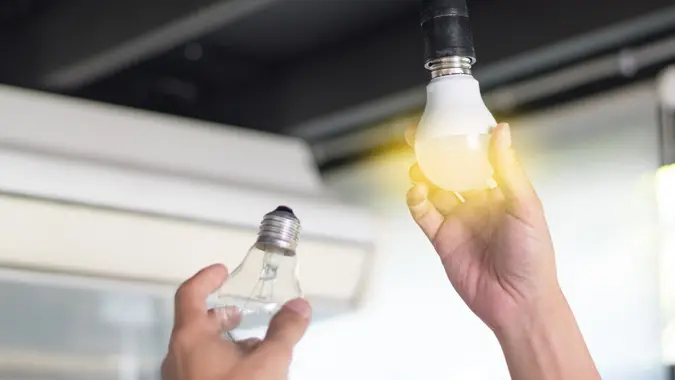5 Things To Stop Buying in 2025

Commitment to Our Readers
GOBankingRates' editorial team is committed to bringing you unbiased reviews and information. We use data-driven methodologies to evaluate financial products and services - our reviews and ratings are not influenced by advertisers. You can read more about our editorial guidelines and our products and services review methodology.

20 Years
Helping You Live Richer

Reviewed
by Experts

Trusted by
Millions of Readers
It’s fair to say that during the year, we tend to accumulate a plethora of things we might not necessarily need. Early 2025 is the perfect time to begin discarding this waste.
Below are some of the top things experts recommend you stop buying next year.
Rethink Unused Subscriptions and Services
“One of the biggest areas where I see people bleeding money is unused subscriptions,” said Shirley Mueller, finance expert and founder of VA Loans Texas.
Whether it’s streaming platforms, gym memberships or meal delivery services, she said these recurring charges add up quickly.
“With inflation hitting wallets harder than ever, it’s important to take a closer look at what you’re paying for versus what you’re actually using,” Mueller added.
For example, someone paying $15 a month for four streaming services but only watching one could save hundreds of dollars a year by cutting the rest.
“I tell clients to go through their bank statements line by line every few months to identify these ‘silent’ expenses — they often don’t realize how much money is being wasted,” Mueller said.
She advised those savings can be redirected toward paying down debt or building an emergency fund, both of which are far more impactful for your financial health.
Avoid Overpaying for Trend-Driven Products
The urge to keep up with trends, whether it’s the latest tech gadgets, designer items or fast-fashion hauls, can quickly derail savings goals.
“I often see clients with unnecessary credit card debt tied to purchases that lose their value or usefulness within months,” said Mueller. “For example, upgrading a perfectly functional phone just for a new feature can cost upwards of $1,000 — money that could be earning interest in a retirement account instead.”
Before making any non-essential purchase, she encourages people to ask themselves: “Will this item still add value to my life in a year?
“If the answer is no, that money is better off invested or saved. In 2025, staying disciplined and prioritizing financial security over short-lived gratification will be the smartest choice for consumers.”
Non-Energy-Efficient Light Bulbs
According to Max Avery, a chief business development officer at Syndicately, if you’re still buying incandescent or halogen bulbs, it’s time to switch to LEDs.
“They consume significantly less energy, last much longer, and save money on your electricity bill over time,” he said. “According to the U.S. Department of Energy, LEDs use at least 75% less energy and last 25 times longer than incandescent bulbs.”
Avery noticed they now come in a variety of styles to fit any aesthetic.
“Look for the ENERGY STAR label to ensure you’re purchasing an energy-efficient bulb,” the expert added.
Chemical Air Fresheners
“I would point out that sprays, plug-ins and gel-based air fresheners often contain harmful chemicals that compromise indoor air quality,” said Avery.
He recommended replacing them with natural alternatives like essential oil diffusers, activated charcoal bags or house plants that purify the air.
“I often like to use a combination of these options such as diffusing peppermint essential oil, placing activated charcoal bags in closets and bathrooms and having a few air-purifying plants scattered throughout my home,” Avery noted. “These keep my home smelling fresh and clean without introducing toxins.”
Bottled Water
Avery noted that many people invest in bottled water because they believe it’s safer or better tasting than tap water.
“According to research, up to 40% of bottled water is actually sourced from tap water and is not any safer or better tasting,” he noted.
The expert advised investing in a high-quality reusable water bottle and a home water filtration system.
“This reduces plastic waste, cuts long-term costs by up to thousands of dollars, and ensures you have clean water wherever you go,” Avery said. “Tap water is highly regulated and often contains added minerals for taste.”
 Written by
Written by  Edited by
Edited by 
























